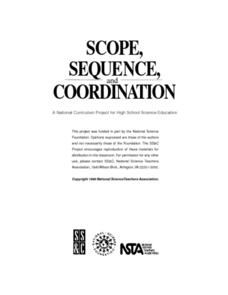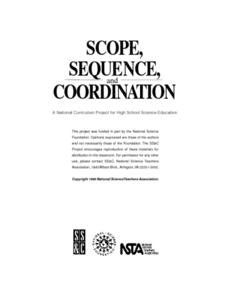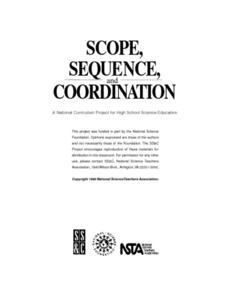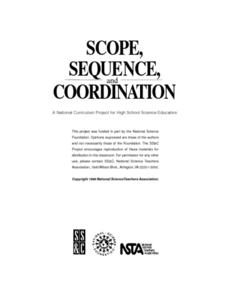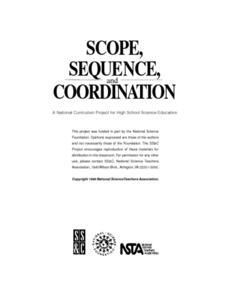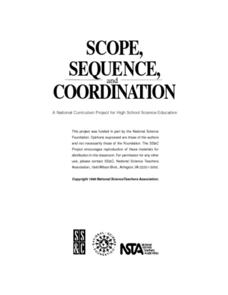Curated OER
Fossils and Lithologic Units
Practicing paleontologists map the geologic time scale, simulate the formation of sedimentary rock, and analyze fossil data. Instructions for four activities and five assessment choices are provided for the teacher. This comprehensive...
Curated OER
Inertial Mass, Weight, and Newton's Second Law of Motion
The stage is set for you to guide future physicists through three forceful activities about motion. In the first, learners experiment with rolling carts to discover how objects interact. In the second, they inspect images of an object in...
Curated OER
Impulse, Momentum, and the Conservation of Momentum
What happens when two worlds collide? In the first of several activities, future physicists experiment with colliding ball bearings or Newton's cradle. Another activity requires the use of an air track with cars to examine collision....
Curated OER
Measures of Circular Motion
Physicists become Olympians in a competition using centripetal force. They ride a bicycle to comprehend relationships between linear and rotational motion. If you have an old-fashioned record player, it can be used to help pupils...
Curated OER
Qualitative Aspects of Rotational Dynamics
Explanations for six different physics lab activities and five suggested assessments are contained in this resource by the National Science Teachers Association. Any combination can be used to open learners' eyes to rotational motion....
Curated OER
Understanding Behavior of Gases
If you want your young chemists to fully grasp the behavior of gases, here is an all-inclusive lesson plan. It provides handouts of detailed instructions for three laboratory activities, assessment reccomendations, and a list of...
Curated OER
Air Resistance and Friction
Physics learners experiment with three laboratory activities to learn about air resistance and friction. First, they use a hair dryer to move different sized spheres to determine the relationship between cross-sectional area and air...
Curated OER
Properties of Aqueous Solutions
Advanced chemistry kids experiment with the freezing and boiling points of various aqueous solutions. They also prepare a presentation of the kinetics of solution formation and structure of the matter involved. This resource provides...
Curated OER
Cell Size and Shape; Diffusion and Osmosis Processes
Use salmon eggs as a cell model for demonstrating the movement of water over concentration gradients. Junior scientists examine the same process microscopically with an onion cell. They use a thistle tube and a semipermeable membrane to...
Curated OER
Hooke's Law, Vibrations, Mechanical Waves, and Sound
Dangle a spring to experiment with vibration and discover if period is dependent on amplitude. Strum a guitar and adjust the strings to compare displacement and sound. Use a Slinky® and guitar strings on a ring stand to uncover the...
Curated OER
Qualitative Examples of Conservation of Mechanical Energy
Instructions for series of six activites, a reading of scientific literature, and a choice of six assessments await you in this physics resource. Well-written plans guide you in guiding your pupils to experiment with levers, pulleys,...
Curated OER
Heat Energy Released or Absorbed in Chemical Reactions
Chemistry whizzes test the change in water temperature produced by a burning candle and the change in acid temperature produced by magnesium metal. With these two laboratory activities they explore heat produced during chemical...
Curated OER
Coulomb's Law and Induced Polarization
Engage your aspiring physicists in a series of lab activities directied at demonstrating the behavior of electric force. In completing these exercises, learners will explore Coulomb's and Gauss's Laws. Well-written directions to four...
Curated OER
Magnetic Induction
Physicists of the future observe the behavior of current in relation to a magnet through several inquiry activities. They construct a generator and experiment with solenoid coils. They learn and apply electromagnetic laws, most often...
Curated OER
Wave Phenomena and the Electromagnetic Spectrum
Science learners scrutinize shadow size and quality, and experiment with diffraction. They model superposition of electromagnetic waves, and experiment with interference. These activities are action-packed and challenging for your...
Curated OER
The Periodic Table, Electrons, and Chemical Bonds
Four activities immerse beginning chemists into the world of elements. They examine the periodic table, use cobalt hydroxide to learn about chemical formulae and valence electrons. Also, they name binary compounds and examine the...
Curated OER
Carbon Bonds in Chemistry
Venture into the world of macromolecules with three exciting, distinct laboratory activities. Young chemists examine the forms of carbon and discover how they are associated with atomic arrangement, construct models of carbon-containing...
Curated OER
The Watson-Crick Model of DNA Structure
Junior geneticists construct models of DNA to discover sequencing and pairing of nucleotides. They use the models to simulate protein synthesis and then translate the codes into physical traits. Finally, they use the traits to create a...
Curated OER
Cellular Organelles
Wow! Separate organelles from the cells of dried peas. Observe vacuoles in beet cells. Watch protists in action. Examine SEM photographs. Beginning biologists get a complete exposure to the structure and function of cell organelles. Two...
University of Rhode Island
Food Safety Smart Curriculum
This is a must-have resource with everything you'll need for studying food safety with your pupils. From handwashing scorecards and cleaning kitchen surfaces to navigating the world of microbes and food-borne illnesses, here you'll...
American Chemical Society
pH and Color Change
Did you know strong bases can feel slippery and slimy? Lesson allows scholars to practice using the pH scale to identify acids and bases and their strengths. By changing the concentration of an acid and a base, they create the entire...
University of California
Equal Rights? The Women's Movement from Suffrage to Schlafly
If you've never heard of the Equal Rights Amendment, it's probably because there isn't one in the United States Constitution. Delve into the contentious history behind the ERA, its founders and supporters, and reasons for its political...
Curated OER
Variation and Heredity
Junior geneticists tally eye color and height in their lab groups. They examine certain traits in soybean and corn seedlings. For each activity, they gather data and learn about continuous and discontinuous genetic variation. In another...
Curated OER
Phase Changes of Water
A micro-unit on the phase changes of water includes three laboratory activities. Junior scientists compare the densities of ice and water, and then they do the same for cold and warm water. They examine freezing and boiling temperatures....


